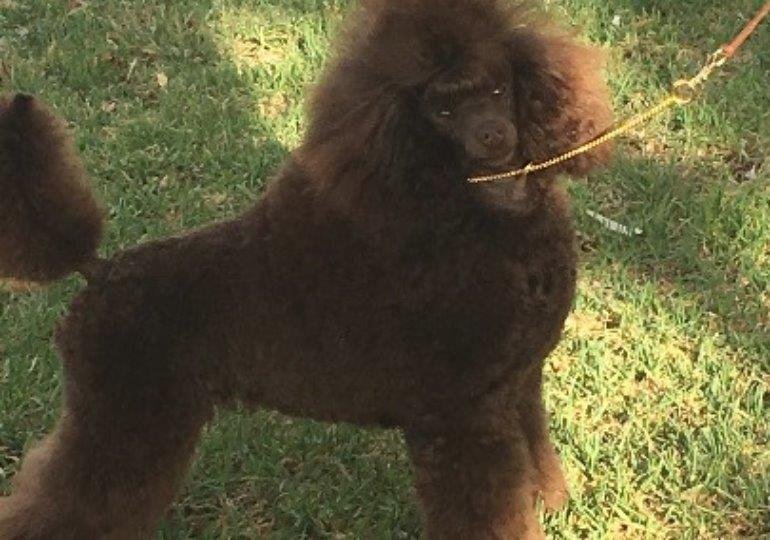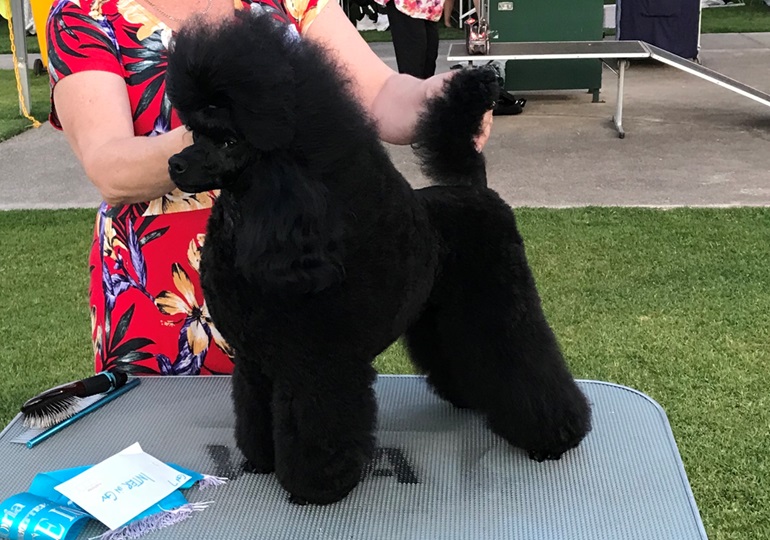Breeds
Poodle (Toy)
 01_adobe_express.jpeg)
GROUP 7 - NON SPORTING
Brief History
Although it is somewhat difficult to be precise about the origins of the Poodle, there are references in art and literature dating back earlier than the 12th century. Often incorrectly attributed to being solely a French breed, the Poodle is of German origin, with the name coming from the German word “pudelin”, which means to splash. There is certainly Russian, together with some French influence, attributed to the modern day Poodle. The Poodle was greatly revered as a water retrieving dog, combining many traits to be successful in this activity. One of the most significant aspects of the evolution of the Poodle is that it was established in three size varieties, Standard, Miniature and Toy.
Average Life Span
When considering a dog, please realise that you are taking it on for its lifetime.
The average life span will vary across the size varieties. The Standard 10 to 12 years and the Miniature and Toy 12 to 15 years.
Temperament
Poodles of all varieties are extremely intelligent, very trainable, highly adaptable and versatile. They require both physical and intellectual activities. The Poodle also enjoys human company and interaction.
General Breed Description
The Poodle is a very energetic, intelligent, sociable and an extremely proud dog. Each variety should have the same physical traits and temperament, just in different sized bodies. They make exceptional pets due to their highly trainable nature and excel as performance dogs, therapy dogs and of course companion dogs. It is a breed that cannot be considered an outside dog or left alone for long periods of time. The Poodle comes in many beautiful solid colours, including black, white, brown, silver, cream, blue and apricot.
Coat and Care requirements
The nature of the Poodle coat makes it a high maintenance breed. The non-shedding, curly, thick coat has many advantages, but for the comfort and hygiene of the dog and health of the skin, it needs to be brushed regularly to remove dead hair from the coat and keep free of tangles. It is recommended that he be bathed and clipped every 6-8 weeks. The non-shedding nature has great appeal to allergy sufferers. As well as being able to style the Poodle into many different clips and trims. All breeds of dogs enjoy daily exercise to relieve boredom and increase stimulation and the Poodle is no exception. More exercise is required for the Standard Poodle than the smaller varieties.
Size
Toy Poodle: Height at shoulder should be under 28cms (11ins).
Miniature Poodle: Height at shoulder 28cms (11ins) to 38cms (15ins).
Standard Poodle: Height at shoulder above 38cms (15ins).
Health
All breeds have individual health issues. When speaking to breeders in is recommended you enquire about breed health and what health testing the breeder does. The Poodle is generally a healthy breed, however health conditions do occur occasionally it is recommended you enquire about general breed health. For Toys and Miniatures, a DNA test for Progressive Retinal Atrophy (PRA) should be completed. Other concerns include Luxating Patellas (unstable knee) and Legg-Perthe’s Disease. For Standard Poodles, DNA tests for Degenerative Myelopathy, Neonatal Encephalopathy and Von Willebrand’s Disease should be completed along with x-rays for Hip Dysplasia. Sebaceous Adenitis, an auto immune condition can also be tested for. Buying a puppy from a knowledgeable breeder who completes health testing will increase your chances of getting a healthy puppy, irrespective of breed.
Suitability
As there is a choice of 3 sizes, chances are, if the Poodle is for you, one of the varieties will meet your needs. The Toy and Miniature Poodle are ideal for those who may live in apartments or with limited space. They are often more favoured by retired people but fit in well with families. The Standard Poodle is an athletic dog and will require more exercise. All three varieties generally adapt well to most living situations. As with any breed of dog, training is highly recommended. All varieties of Poodle excel in obedience and performance competition. The intelligent nature of the breed does require them to be challenged to alleviate boredom.
In Conclusion
Now you know a little more about this breed. If you have decided this is the dog for you and wish to investigate further, please contact the Breed Club or Dogs Victoria. They will be able to give you information about available puppies and also suggest dog events where you can see the breed and speak to breeders. In this way you will gain a better perspective of the breed and its needs. With any breed of dog, it is important to research and determine suitability for your lifestyle before committing to a puppy which will be a part of your family for many years to come.
Whilst many breeds are recommended for families, it is imperative that when children are with dogs they are supervised at all times. Basic obedience training is a vital part of dog ownership.
Dogs Victoria is about the responsible ownership of all dogs and in particular the preservation of pure breeds.
Link to Dogs Australia Breed Standard: https://dogsaustralia.org.au/breed/detail/91
Breeders





